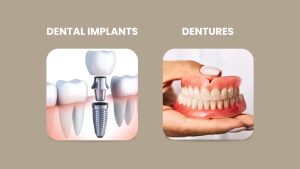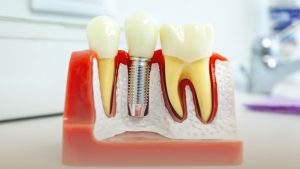
Are you tired of covering your mouth every time you smile? Missing teeth can really make you self-conscious and underconfident. Whether you have lost just a single tooth or a full arch of gaps, you have two competing options to make the right choice for yourself. These are dental implants vs dentures.
However, the real question still stands, i.e, which option is right for you. In this blog, we’ll dive deep into the pros and cons of dental implants and dentures for missing teeth, compare the cost of dentures vs implants, and help you decide which option will give you the best results for your budget and lifestyle. Let’s explore everything you need to know about these two popular solutions!
Dental Implants vs Traditional Dentures
Dentures and implants each have their own features, so it’s important to understand them and discuss the right option with your dentist. Ultimately, they both serve the same purposes:
- Help you chew food easily
- Support facial muscles
- Help you speak properly
- Provide a boost to your self-esteem
However, there are also significant differences between the two, and it is advised to know them.
The key difference between dental implants and traditional dentures is stability and longevity. Implants are more permanent and offer a secure, natural feel, while traditional dentures are removable and need to be removed each night.
Additionally, dental implants for missing teeth can help preserve bone health, something that dentures can’t do. On the other hand, traditional dentures are a more affordable short-term solution that works for people who need a more immediate fix.
How Much Do Dental Implants Cost?
Dental implants are known for their durability and natural appearance. They are surgically implanted into the jawbone and come with a higher initial investment. Here’s a breakdown of the typical costs involved in getting dental implants:
|
Cost Factor |
Details |
|
Average Cost per Tooth |
$1,500 to $6,000 |
| Additional Costs |
Surgery, Bone Grafting, Follow-up Visits |
|
Type of Treatment |
Surgical procedure (requires healing time) |
| Long-Term Cost |
Higher initial cost, but it can last a lifetime with proper care |
|
Customization |
Highly customizable, tailored to individual needs |
| Insurance Coverage |
Often partially covered by insurance |
| Additional Procedures (if needed) |
Bone grafting, sinus lifts, or other preparatory treatments |
Dental implants offer a long-lasting, secure solution for missing teeth. While the upfront cost is higher, their durability and natural feel make them a popular choice for those seeking a permanent fix. Keep in mind that the process involves surgery and recovery time, which can affect the total cost.

How Much Do Dentures Cost?
Dentures are removable false teeth that can be fitted into your mouth. However, they require a few adjustments and replacements over time. Here’s what you can expect when considering dentures:
|
Cost Factor |
Details |
| Average Cost per Tooth (Full Dentures) |
$600 to $3,000 (Full Dentures) |
|
Additional Costs |
Adjustments, Repairs, Denture Adhesives |
| Type of Treatment |
Non-invasive, removable treatment |
|
Long-Term Cost |
May need replacement every 5-10 years; additional maintenance costs |
| Customization |
Customizable, but may require adjustments over time |
|
Insurance Coverage |
Often partially covered by insurance |
| Additional Procedures (if needed) |
Relining, adjusting, and repairing dentures as needed |
Dentures are a great budget-friendly option for replacing missing teeth. While the cost is lower than implants, you may need to replace or adjust them as time goes on. However, they are a good non-invasive option for those who want a quick solution rather than surgery.
How Long Do Dental Implants Last?
One of the best features of dental implants is their longevity. With proper care, dental implants for missing teeth can last a lifetime. The materials used in implants are usually titanium, which is highly durable and resistant to decay. Plus, implants fuse with the jawbone, offering a secure fit that other tooth replacement options can’t match.
However, like any medical procedure, there are some risks involved. Risks of dental implants include potential infection, nerve damage, or implant failure. This is why it’s essential to work with an experienced dentist and follow dental implants aftercare instructions carefully to minimize these risks.
How Long Do Dentures Last?
Dentures are designed to be a temporary solution for missing teeth, but they do have a relatively good lifespan. On average, traditional dentures last between 5 and 10 years, depending on how well they’re maintained. However, they tend to wear down over time, requiring adjustments or even replacements as your mouth changes shape.
The maintenance of dental implants is much less frequent. With proper oral hygiene, your implants can last much longer than dentures. Disadvantages of dentures include their tendency to shift and cause discomfort, especially if they aren’t well-fitted. This can lead to issues with speaking and eating.
Pros and Cons of Dental Implants
There are plenty of advantages of dental implants:
- Look real and similar to natural teeth.
- They are permanent and stable, and don’t require adhesives.
- Good at preserving bone structure.
- They are long-lasting and reduce the signs of aging.
The cons include:
- They require an intimidating surgery and a long healing time.
- They are more expensive than dentures.
- Multiple appointments are necessary for the procedure.
Pros and Cons of Dentures
There are many pros to consider:
- Quite affordable and non-invasive.
- Very easy to clean and manage.
- They can be customized and easily adjusted or replaced.
- They restore facial aesthetics as they provide a full arch.
Choosing dentures does have a few disadvantages:
- They can easily slip out of place.
- Over time, they can shift and cause discomfort.
- They can feel bulky and or unnatural as well.

Dental Implants and Dentures Maintenance
Proper maintenance of dental implants and dentures is crucial for their longevity and function.
Dental Implants Maintenance:
- Brush and floss daily to avoid gum disease.
- Visit your dentist regularly to check the implants.
- Follow dental implants aftercare instructions for optimal healing.
Dentures Maintenance:
- Clean daily with a soft brush and denture cleaner.
- Soak overnight to maintain shape.
- Visit your dentist for adjustments as needed.
Proper care ensures both options last longer and stay comfortable.
Conclusion: Making the Right Choice
Choosing between dental implants vs dentures is a personal decision that depends on many factors. It’s important to weigh the cost of dentures vs implants, how long they last, and how much maintenance each option requires.
If you’re unsure which option is best for you, consult with the experts at Orange Premier Dental. Our team is here to help you make an informed decision and find the right solution for your smile. Contact us today to schedule your consultation and take the first step toward a confident, healthier smile!
Whether you choose dental implants for missing teeth or dentures for missing teeth, knowing the facts will help you make an informed choice that will improve your smile and your quality of life.
Frequently Asked Questions
1. Which one is better, dentures or implants?
Implants may be the better choice due to stability. However, the right choice depends on the patient’s individual needs.
2. How painful is a dental implant?
Dental implant surgery is not painful if done under local anaesthesia. However, post-surgery discomfort is common.
3. Are dentures painful?
Dentures cause a little discomfort as your gums and mouth get used to them.

Dr. Shierf Elgamal is the lead dentist at Orange Premier Dental in Orange County. A graduate of Loma Linda University School of Dentistry (2013), he has extensive experience across all areas of general dentistry and is dedicated to providing patients with honest, straightforward care. Over the years, Dr. Elgamal has worked in multiple practices, gaining valuable skills that he now brings to his own clinic.







